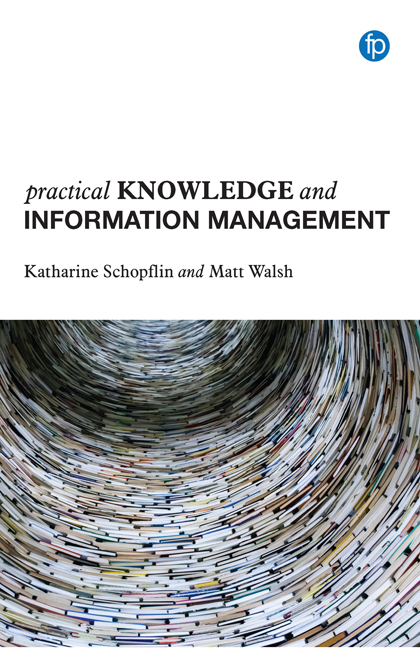Book contents
- Frontmatter
- Contents
- Case studies and sidebars
- 1 Introduction to knowledge and information management
- 2 Introducing knowledge and information management to organizations
- 3 Information management and governance
- 4 Communities and knowledge-sharing
- 5 Making knowledge explicit: knowledge bases, know-how and wikis
- 6 Capturing knowledge legacy: passing on staff knowledge
- Afterword: the future of knowledge and information management
- References
- Index
5 - Making knowledge explicit: knowledge bases, know-how and wikis
Published online by Cambridge University Press: 01 June 2019
- Frontmatter
- Contents
- Case studies and sidebars
- 1 Introduction to knowledge and information management
- 2 Introducing knowledge and information management to organizations
- 3 Information management and governance
- 4 Communities and knowledge-sharing
- 5 Making knowledge explicit: knowledge bases, know-how and wikis
- 6 Capturing knowledge legacy: passing on staff knowledge
- Afterword: the future of knowledge and information management
- References
- Index
Summary
This chapter is about the structured homes we make for expressed knowledge: wikis, enquiries databases, frequently asked questions (FAQs), knowledge bases and know-how pages. Such expressions of shared learning have always existed in organizations, either as official, final, published documents or as quality-assured databases managed by professionals. They were reliable and authoritative, but a coagulation of knowledge at a particular moment. Modern tools allow knowledge repositories to be continually updated and represent a wide range of voices. However, all such repositories are compromises between authority and immed - iacy, and certain, approved knowledge and ongoing thoughts and opinions under discussion. They are also compromises between the diversity of views held by participants and a consensus turned into accepted fact. Structure, provided by categories and tags, offers a means of helping users find information in the future, but can be burdensome for contributors to add as they contribute. And any structure is itself a compromise as subject tags always are, whether imposed by a KIM professional, worked out within a group, or referring to an already existing corporate or industry taxonomy.
Many people writing about KM like to suggest that, once recorded, knowledge becomes information. In his highly amusing take-down of the then emerging fad of KM, Wilson (2002) asserted that knowledge ‘cannot be ‘captured’ – it can only be demonstrated through our expressible knowledge and through our acts’. Wilson was working within a framework which suggested that knowledge acquisition is something that happens as we negotiate our way through the world. The artefacts we create along the way relate to this knowledge, but are not knowledge themselves. Wenger (1998) felt that the ‘reifications’ of ongoing learning and knowledge-sharing (such as databases, manuals or reports) are valuable even though they could only ever be temporary and imperfect representations of an ongoing practice. Whatever you call these reified objects, and whether or not you consider them to be knowledge or merely information, they are an essential part of the corporate record. A huge and essential part of the work of the knowledge manager is to facilitate the creation of repositories of corporate knowledge and to manage them in such a way that content can be found again.
- Type
- Chapter
- Information
- Practical Knowledge and Information Management , pp. 75 - 90Publisher: FacetPrint publication year: 2018



